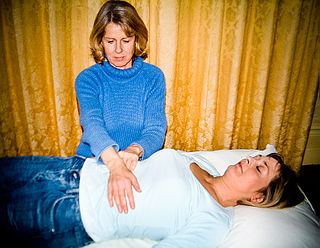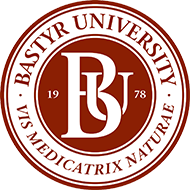Alternative medicine is any practice that aims to achieve the healing effects of medicine despite lacking biological plausibility, testability, repeatability or evidence of effectiveness. Unlike modern medicine, which employs the scientific method to test plausible therapies by way of responsible and ethical clinical trials, producing repeatable evidence of either effect or of no effect, alternative therapies reside outside of mainstream medicine and do not originate from using the scientific method, but instead rely on testimonials, anecdotes, religion, tradition, superstition, belief in supernatural "energies", pseudoscience, errors in reasoning, propaganda, fraud, or other unscientific sources. Frequently used terms for relevant practices are New Age medicine, pseudo-medicine, unorthodox medicine, holistic medicine, fringe medicine, and unconventional medicine, with little distinction from quackery.
Magnetic therapy is a pseudoscientific alternative medicine practice involving the weak static magnetic field produced by a permanent magnet which is placed on the body. It is similar to the alternative medicine practice of electromagnetic therapy, which uses a magnetic field generated by an electrically powered device. Magnet therapy products may include wristbands, jewelry, blankets, and wraps that have magnets incorporated into them.

Reiki is a pseudoscientific form of energy healing, a type of alternative medicine originating in Japan. Reiki practitioners use a technique called palm healing or hands-on healing through which, according to practitioners, a "universal energy" is transferred through the palms of the practitioner to the client, to encourage emotional or physical healing. It is based on qi ("chi"), which practitioners say is a universal life force, although there is no empirical evidence that such a life force exists.
The National Council Against Health Fraud (NCAHF) was a not-for-profit, US-based organization, that described itself as a "private nonprofit, voluntary health agency that focuses upon health misinformation, fraud, and quackery as public health problems."

Quackery, often synonymous with health fraud, is the promotion of fraudulent or ignorant medical practices. A quack is a "fraudulent or ignorant pretender to medical skill" or "a person who pretends, professionally or publicly, to have skill, knowledge, qualification or credentials they do not possess; a charlatan or snake oil salesman". The term quack is a clipped form of the archaic term quacksalver, derived from Dutch: kwakzalver a "hawker of salve" or rather somebody who boasted about their salves, more commonly known as ointments. In the Middle Ages the term quack meant "shouting". The quacksalvers sold their wares at markets by shouting to gain attention.

Bastyr University is a private alternative medicine university with campuses in Kenmore, Washington, and San Diego, California. Programs include naturopathy, acupuncture, Traditional Asian medicine, nutrition, herbal medicine, ayurvedic medicine, psychology, and midwifery.

Allopathic medicine, or allopathy, is an archaic and derogatory label originally used by 19th-century homeopaths to describe heroic medicine, the precursor of modern evidence-based medicine. There are regional variations in usage of the term. In the United States, the term is sometimes used to contrast with osteopathic medicine, especially in the field of medical education. In India, the term is used to distinguish conventional modern medicine from Siddha medicine, Ayurveda, homeopathy, Unani and other alternative and traditional medicine traditions, especially when comparing treatments and drugs.
The National Center for Complementary and Integrative Health (NCCIH) is a United States government agency which explores complementary and alternative medicine (CAM). It was created in 1991 as the Office of Alternative Medicine (OAM), and renamed the National Center for Complementary and Alternative Medicine (NCCAM) before receiving its current name in 2014. NCCIH is one of the 27 institutes and centers that make up the National Institutes of Health (NIH) within the United States Department of Health and Human Services.

Stephen Joel Barrett is an American retired psychiatrist, author, co-founder of the National Council Against Health Fraud (NCAHF), and the webmaster of Quackwatch. He runs a number of websites dealing with quackery and health fraud. He focuses on consumer protection, medical ethics, and scientific skepticism.

Quackwatch is a United States–based website, self-described as a "network of people" founded by Stephen Barrett, which aims to "combat health-related frauds, myths, fads, fallacies, and misconduct" and to focus on "quackery-related information that is difficult or impossible to get elsewhere". Since 1996 it has operated the alternative medicine watchdog website quackwatch.org, which advises the public on unproven or ineffective alternative medical remedies. The site contains articles and other information criticizing many forms of alternative medicine.

Energy medicine is a branch of alternative medicine based on a pseudo-scientific belief that healers can channel "healing energy" into patients and effect positive results. The field is defined by shared beliefs and practices relating to mysticism and esotericism in the wider alternative medicine sphere rather than any sort of unified terminology, leading to terms such as energy healing, vibrational medicine, and similar terms being used synonymously. In most cases, no empirically measurable "energy" is involved: the term refers instead to so-called subtle energy. Practitioners may classify their practice as hands-on, hands-off, or distant wherein the patient and healer are in different locations. Many approaches to energy healing exist: for example, “biofield energy healing”, “spiritual healing”, “contact healing”, “distant healing”, therapeutic touch, Reiki, and Qigong.

Steven Paul Novella is an American clinical neurologist and associate professor at Yale University School of Medicine. Novella is best known for his involvement in the skeptical movement as a host of The Skeptics' Guide to the Universe podcast and as the president of the New England Skeptical Society. He is a fellow of the Committee for Skeptical Inquiry (CSI).
The National Health Federation (NHF) is a lobbying group which promotes natural medicine. The NHF is based in California and describes its mission as protecting individuals' rights to use dietary supplements and alternative therapies without government restriction. The NHF also opposes mainstream public-health measures such as water fluoridation and compulsory childhood vaccines.

Harriet A. Hall was an American family physician, U.S. Air Force flight surgeon, author, science communicator, and skeptic. She wrote about alternative medicine and quackery for the magazines Skeptic and Skeptical Inquirer and was a regular contributor and founding editor of Science-Based Medicine. She wrote under her own name or used the pseudonym "The SkepDoc". After retiring as a colonel in the U.S. Air Force, Hall was a frequent speaker at science and skepticism related conventions in the US and around the world.
Wallace Sampson, also known as Wally, was an American medical doctor and consumer advocate against alternative medicine and other fraud schemes. He was an authority in numerous medical fields, including oncology, hematology, and pathology. He was Emeritus Professor of Clinical Medicine at Stanford University. He was the former Head of Medical Oncology at Santa Clara Valley Medical Center, and a member of the faculty at the Skeptic's Toolbox 1998–2008.

Kimball C. Atwood IV is an American medical doctor and researcher from Newton, Massachusetts. He is retired as an assistant clinical professor at Tufts University School of Medicine and anesthesiologist at Newton-Wellesley Hospital.
Robert Sears Baratz is an American dentist and skeptic who practices in Braintree, Massachusetts. Baratz has practiced dentistry since 1972 and emergency medicine since 1991. He was formerly the executive director of the National Council Against Health Fraud (NCAHF).
William Tyler Jarvis was an American health educator and skeptic.










